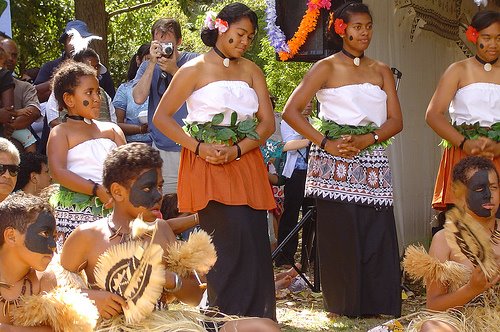SEEING the large cane baskets on sale at the ROC market yesterday was a reminder of the Melanesian Festival last year.
The cane baskets of Papua New Guinea native, Rana Sapu, were a popular attraction yesterday.
Rana has been living here for the past six years.
Her family relocated to Suva after her husband secured a job at the University of the South Pacific.
She manages the home and in her spare time indulges in craft work and a bit of gardening.
She says she did not have trouble adjusting to life in Fiji as it was similar to PNG.
"We have five kids and I don't work," she smiled.
"But I do some gardening I like flowers and have taken to planting cuttings, even some that have been thrown away by people," she said.
"For cuttings that have been discarded by others, I just plant them and keep tending them.
"I plant vegetables and herbs at home as well because the cost of vegetables in the market is quite expensive, especially the tomatoes."
But back to her PNG ware, Rana says the laundry baskets that are about a foot tall, are made from a kind of cane quite similar to bamboo.
And she says they are very strong, so strong in fact that they can easily outlive you, if you decided to buy one for your home.
"These baskets are strong and they last for many years," she says.
"Even your grandchildren will be able to use it if you buy one," she said.
That basically says a lot for the sturdiness of these baskets and it is probably be safe to say that money spent on one will be money well spent.
Now apart from the laundry baskets, there are smaller baskets or maybe we should call them trays that are for little bits and pieces around the home or the office, whichever suits your fancy.
Hanging in front of her stall were the woven bilum or bags that PNG is famous for as they are colourful and are handwoven.
"These are called bilum and are done through needlework," says Rana.
And although it may seem like the bags will take a little time to finish, Rana says otherwise.
"The bilum takes a long time to complete because the kula (woollen strands) had to be rolled out before you can use it to weave the bags."
She says in the process, the kula is rolled in such a way so that it can be knitted into a bag.
It is complicated process and not as easy or simple as it looks.
"It's easier for you to see what is being done rather than explaining."
The other kind of bilum she was selling were made out of a material that she said was similar to pandanus leaves or voivoi and these are very steady.
Rana says these bags or bilum are used by women in PNG to carry food to the plantations and farms and have even been used to carry babies.
So you can only imagine how long these bags can last probably as long as the laundry baskets.
Oh, and Rana doesn't really make these here as she gets them when she goes home for a visit but she does make the kula woven bags but yesterday she had the lone bag she had completed hanging up for sale and says she doesn't really have that much time to keep knitting them.
"They take a lot of time to make."
So during her visit home over Christmas last year, Rana brought back a few of her native wares and markets them whenever possible.
She has been a frequent face at the ROC Market over the last year and this year and says she loves coming there because she gets to meet a lot of people.
But this she does alone or with friends as her kids prefer to stay at home rather than accompany her to the market.
Bula ! Read the latest from Fijituwawa News here. We invite users who have an interesting newsworthy story concerning our Fijian community to send it to us via email. Thank you.
Fijituwawa Links
Fiji Times Online - Local News
Fijituwawa Dance Group 2007

Hamilton Fijian Mixed dance group, from back L to R: Merewairita (Namosi), Alfreda (Vanua Levu/Samoa), Ashley (Kadavu) and Mereoni (Naitasiri). Front are: Desmond (Vasu Naitasiri), Tukai (Kadavu) and Daniel (Vasu Naitasiri)
Fijituwawa Archive
-
▼
2007
(89)
-
▼
June
(21)
- Meet Agapito Muawalu from Labasa
- Peniasi Yearns for a Miracle
- Rugby's Forgotten Warriors
- Meet Mereseini Nabua
- True Son of the Land
- Brothers Kanaki headline Festival
- The Man with the Keen Eye-Iqbal Jannif
- Hard work pays for villager
- Cama cashes in on Balabala
- Tarun Writes his Own Tune
- Selina's Good Hearted Woman
- Rana's baskets last a lifetime
- Yash leaving lasting impact
- Francis cant stop Painting
- Ultimate Test for Teachers
- The aspiring footballer who became a linguist
- Etonia works for the disabled
- A friend of the hungry ones
- Underwater Coral Farms in Fiji
- Underwater Coral Farms in Fiji
- Father & Son Meet At Last
-
▼
June
(21)
About Fijituwawa
- Fijituwawa News
- Auckland, New Zealand
- Contact us via email: publications@fijituwawa.com